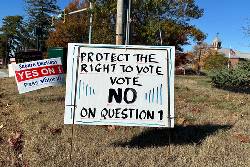PORTLAND, Maine (AP) — Maine and Texas are the latest states to become involved in a nationwide Republican push to enact strict voter ID laws and highlight the rare problem of noncitizen voting, with voters set to decide ballot measures on those issues Tuesday.
Supporters say the initiatives would help safeguard elections, while opponents claim they are intended to make voting more difficult or address issues that aren’t major problems.
The proposal in Texas, where Republicans control the government, is fairly simple: It would amend the Texas Constitution to add “persons who are not citizens of the United States” to the list of those excluded from participating in elections.
Maine’s proposal centers on requiring a photo ID to vote, but it is far more sweeping. The Republican-backed initiative also would limit the use of drop boxes for returning completed ballots and make several changes to the state’s absentee voting system, including eliminating two days of absentee voting and ending ongoing absentee voter status for seniors and people with disabilities.
Voters will decide on the measures at a time when President Donald Trump and national Republicans have pressed for new restrictions on voting, including requiring proof of citizenship.
Maine Gov. Janet Mills is one of many Democrats in the state speaking out against the voter ID initiative that is the centerpiece of Question 1. She said she sees it less as a chance to shore up elections and more as an attack on the right to vote itself.
Proponents of the ID push said it’s about ensuring legal votes count in the state.
The Maine proposal also would limit the number of ballot drop boxes to just one per municipality in a state where mail voting has been growing in popularity.
The ballot initiative is up for approval as the state investigates an allegation that dozens of unmarked ballots, intended for use in this year’s election, were discovered inside a woman’s Amazon order. The secretary of state’s law enforcement division is investigating with assistance from the FBI and other state authorities, Maine Secretary of State Shenna Bellows has said.
The Texas proposal arrives as Republicans in the state have also pushed for a requirement that voters show documented proof-of-citizenship in order to vote. A state Senate bill on the subject failed to gain full legislative approval before lawmakers adjourned in June.
Voters in Texas must already attest to being a citizen when they register to vote, so the amendment being decided Tuesday will have little practical effect. It will add noncitizens to the list of those who are prohibited from voting and do so as a constitutional amendment, making it difficult to change in the future.
Between 2018 and 2024, 14 other states put similar citizenship amendments before voters, and all passed easily. More are expected next year.
Opponents say the amendment is unnecessary because voting by noncitizens in Texas and elsewhere is already rare and illegal. It's a felony punishable with prison time and possible deportation. A handful of cities across the country allow noncitizens to vote in certain local elections, but none is in Texas.
...


